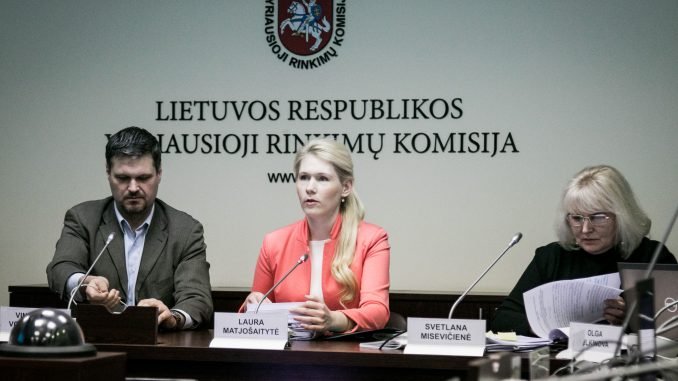
Of the 58 civic electoral committees, which partook in the 2015 municipal elections, 19 had legal entities operating under similar names. The chairwoman of the Central Electoral Commission (VRK) Laura Matjošaitytė proposes to discuss whether such committees should not be expected to declare their relations with organisations and their financial activities monitored.
“Alongisde Baltosios Pirštinės (White Gloves, independent electoral watchdog) we reviewed data on how many committees have links to various organisations. We have 58 electoral committees, 19 organisations have similar names. Of the 19 associations with similar names to organisations, 11 present reports to the Centre of Registers,” L. Matjošaitytė stated during the round table discussion Municipal Elections 2019: how to ensure transparency? on Monday.
The VRK chairwoman proposed to discuss cases where civic movements’ names are akin to those of a legal entity.
“It could be potential efforts to mislead voters, but perhaps everything is fine. Or perhaps we should discuss the usage of names? Perhaps civic electoral committees should declare to the VRK that they have links to certain organisations or movements and then such questions should be regulated by legislators, the association’s financial activities should be monitored for a number of years,” L. Matjošaitytė mused.
She proposed to consider, whether civic electoral committees, whose candidates are elected, should not continue their activities throughout the term.
“Is it legally justified for committees to cease their activities after elections and that’s all?” L. Matjošaitytė asked.
She also raised questions on whether civic electoral committees can participate in a series of elections under the same name or whether they should perhaps establish a regional party.
“2000 members are needed to establish a political party, but perhaps it would be possible to speak of regional level political parties,” L. Matjošaitytė said.
Serious competition for parties
VRK member Svetlana Misevičienė pointed out that during the 2015 municipal council and mayor elections, civic electoral committees became serious competitors against traditional parties.
Civic electoral committees can participate in European Parliament and municipal council elections.
L. Matjošaitytė informed that in 2014, 2 civic electoral committees registered for the European Parliament elections, however neither gathered the legally required number of signatures and practically did not participate in the elections. The first start for electoral committees was in 2015 during the municipal elections.
Prior to these elections, legal regulation was changed. Up to then, the law specified that civic electoral committees are registered by the VRK and their names are simply a letter. Afterward, the Constitutional Court ruled that civic electoral committees have the right to call themselves in full electoral names. Regulations were changed and committees could take various names.
In 2015, 58 committees participated in elections. Five in Šiauliai, four in Alytus and Kaunas each, three each in Panevėžys, Raseiniai and Šilutė regions, as well as the Visaginas municipality.
In most of Lithuania (including Vilnius and Vilnius region), civic committees were not established. “However it would appear that in 2019 we will have a different situation,” L. Matjošaitytė guessed.
In 2015, committee candidates ran for office in 30 municipalities, for a total of 1326 candidates. The number of those elected into councils was 116 and four took the seat of mayor – in Alytus, Kaunas, Panevėžys and Šiauliai.
The most civic electoral committee candidates ran for municipal council member positions in Šiauliai, Alytus, Šilalė, Kaunas and Mažeikiai.
Committees accumulated a total of 121,142 votes. Mayoral candidates gathered 256,974 votes.
During the 2015 elections, candidates from parties took 1326 municipal council seats out of 13,413 party affiliated candidates.
369 mayoral candidates ran for office with the backing of parties, 52 of them took office, while two were elected from coalitions. 33 candidates backed by committees ran for mayor, with four being elected to the position. Also, one candidate took the post of mayor as an independent.
The largest number of votes was garnered by the Vieningas Kaunas committee (35,738 votes), Alytaus Piliečiai (10,120 votes), Povilas Urbšys už sąrašą KARTU (6,581 votes) and Kaunas – kitokia Lietuva (5,660 votes).
The most votes for raised mayoral candidates were obtained by Vieningas Kaunas committee (117,288 votes), Alytaus Piliečiai (16,594 votes), Artūro Visocko nepartinis sąrašas (24,374 votes) and Povilas Urbšys už sąrašą KARTU (24,349 votes).
The largest number of council members was gained by the Vieningas Kaunas committee – 17 (42 candidates), Alytaus Piliečiai – 13 (of 20), Povilas Urbšys už sąrašą KARTU – 8 (of 29).
Differing financing
The VRK chairwoman explained that committee and party financing differs in that civic committees do not have party funds or bank loans.
During the 2015 elections, civic committees spent 324,643 euro from candidates’ personal funds, with individual donations for political campaigns reaching 60,046 euro. Interest for funds held in the campaign account was also available.
Political parties spent 5,1 million euro from party funds, 2.8 million euro from candidates’ private funds, while individual donations made up almost 971 thousand euro. Loans from banks and interest from electoral accounts were also available.
To summarise, the VRK calculated that for committees a mandate cost 4081 euro, while for parties – 3963 euro, the difference being only 145 euro.
Breaches
The VRK chairwoman noted that in the 2015 elections, there were cases where the VRK observed breaches in electoral law.
“Illegal actions were made. This was done by Alytaus Sąjūdis and Puteikio Komanda. These questions were resolved through commission rulings. Regarding Vieningas Kaunas it was recognised that the campaign was financed through third parties,” L. Matjošaitytė stated.
According to her, there were cases of bribery, where concerts were organised. In addition, non-monetary donations were received, for example locales being made available for free.
